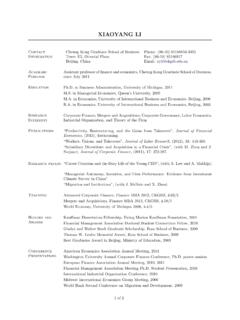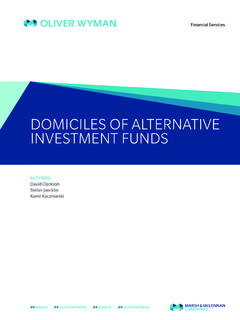Transcription of Hedge Fund Performance Persistence over …
1 Hedge fund Performance Persistence over Different Market Conditions Zheng Sun Ashley W. Wang University of California at Irvine Federal Reserve Board Lu Zheng University of California at Irvine This draft: April 2014 We provide novel evidence that Hedge fund Performance is persistent following periods of relative Hedge fund market weakness, but not following periods of relative market strength. Specifically, we construct two Performance measures, DownsideReturns and UpsideReturns, conditioning on whether the overall Hedge fund market return is below or above its sample median. After adjusting for risk and fund characteristics, funds in the highest DownsideReturns quintile outperform funds in the lowest quintile by 5% in the subsequent year, whereas funds with better UpsideReturns do not outperform subsequently.
2 These findings suggest an error-in-measurement problem embedded in the unconditional average historical Hedge fund returns, which, in turn, weakens their Performance predictability. JEL classification: G10, G23 Key words: Hedge funds, Conditional Performance , Performance Persistence The views presented here are solely those of the authors and do not represent those of the Federal Reserve Board or its staff. We thank George Aragon, Turan Bali, Stephen Brown, Yong Chen, Cristian Tiu, and seminar participants at Aoyama Gakuin University, BIFEC Borsa Istanbul Finance and Economics Conference, Federal Reserve Board, Frankfurt School of Finance and Management, George Mason University, and UC Irvine. Zheng Sun is at the Paul Merage School of Business, University of California at Irvine, CA 92697-3125; tel: (949) 824-6907, email: Ashley Wang is at the Board of Governors of the Federal Reserve System in Washington, DC; tel: (202) 452-3122, email: Lu Zheng is at the Paul Merage School of Business, University of California at Irvine, email: 1 1.
3 Introduction Hedge funds attract institutional investors and high net worth individuals, by offering a prospect of achieving profits in both rising and falling markets. Compared with mutual fund investors, Hedge fund investors usually pay high fees and face various investment restrictions, yet, due to insufficient Hedge fund disclosure requirements, those investors are often presented with limited information when making investment decisions. Arguably, Hedge funds past Performance has become one of the most important metrics for investors to select investments. However, do funds past returns reliably forecast their future Performance ? This question has been addressed by many academic studies, but only with mixed Note that most of the existing literature focuses on unconditional In this paper, we approach this question by focusing on conditional predictability and investigate whether Performance Persistence varies with the overall Hedge fund market conditions.
4 Why may market conditions matter for Performance Persistence ? Let s first consider a scenario under which fund Performance is determined jointly by investment skills and noises. It is possible that fund Performance reveals investment skills to varying extents over different market conditions. For example, Kacperczyk, van Nieuwerburgh, and Veldkamp (2013a) document that mutual funds exhibit a higher dispersion across portfolio positions and returns over recession, despite of stronger co-movement in underlying stock payoffs. This implies that fund managers are likely to become more active over market downturns, collecting and processing their own information and thus making investment decisions that are more different from each other and from the uninformed investors. In addition, Brunnermeier and Nagel (2004) show that skilled 1 Findings on Hedge fund Performance Persistence will be discussed in details in the later part of Introduction.
5 2 One exception is Boyson (2008), which investigates how Hedge fund Performance Persistence varies with fund characteristics. 2 Hedge fund managers chose to herd with the unsophisticated investors during the bubble building period, but differentiated themselves from the rest of the market participants by reducing their positions in the tech stocks when the markets were about to decline. Moreover, it may become more difficult and costly for mediocre managers to mimic skilled ones during down markets. For instance, Jiang and Kelly (2013) shows that in bull markets mediocre fund managers are able to generate great returns and appear skillful by simply taking a leveraged put-writing strategy, however they would suffer significant losses following this strategy during market downturns. As such we expect Performance over the down market to be more informative about skills and hence better predict future Performance .
6 Even under this scenario, there may exist alternative mechanisms that lead to higher information contents in Performance about skills over periods of market strength. For instance, strong market may provide more opportunities for Hedge funds to exploit mistakes made by less sophisticated investors, who tend to enter financial markets when the market is Indeed, using a panel of equity mutual funds, Glode, Hollifield, Kacperczyk and Kogan (2012) document evidence of Performance Persistence following periods of high market returns but not following periods of low market returns. Let s consider another scenario under which Performance is also affected by investor cash flows. Berk and Green (2004) build a theoretical framework, under which investors learn about fund managers heterogeneous skills through past returns, and efficiently allocate capital accordingly. Such unlimited capital supply combined with scarce managerial skills allows fund managers to 3 See Grinblatt and Keloharju(2001), Lamont and Thaler(2003), Brunnermeier and Nagel (2004), and Cooper, Gutierrez, and Hameed (2004).
7 3 grasp the full gains of active investments, thus driving away Performance Persistence even in the presence of superior investment skills. Under their model, Performance Persistence could arise if investors make inefficient capital allocations based on past Performance , and the Persistence pattern could differ across market states, if the extent of capital allocation inefficiency varies with market conditions. There are several reasons why the degree of inefficiency may vary with market states. First, investor may pay different amount of attention across market states. For example, several papers document evidences for an ostrich effect among investors, under which individuals monitor their investments and attend to information more closely upon receiving good news but choose to tune out after getting bad This effect may result in less attention paid to Hedge funds past Performance amid relative market weakness, which, in turn, could lead to stronger Performance Persistence in the down market.
8 Granted that Hedge fund investors are a different group from individual stock market participants, whether they exhibit different behaviors across market states is, by itself, an unexplored empirical question. Second, even if investors pay equal amount of attention in different market states, should past Performance in certain market conditions contain more signals about managerial skills than in others, investors would still under-react to such Performance measures that better reveal skills, leading to Performance Persistence . In light of the arguments above, whether and how Performance Persistence varies with market conditions, ultimately, is an empirical question. In this study, we examine Performance 4 See Karlsson, Loewenstein, and Seppi (2009), Sicherman et al. (2012), and Hou, Peng, and Xiong (2009). 4 Persistence conditioning on the overall conditions of Hedge fund sector.
9 We start by constructing two conditional Performance measures, DownsideReturns and UpsideReturns, which are based on conditional time-series average returns of individual funds when the overall Hedge fund sector Performance is below (or above) the sample median, respectively. Our main test concerns the relation between the DownsideReturns and UpsideReturns measures and future fund Performance . Our fund Performance evaluation metrics include: Fung-Hsieh seven-factor alpha, appraisal ratio and the Sharpe Ratio. We find that funds with better DownsideReturns significantly outperform their peers in all Performance metrics over the next 3 months to 2 years. In contrast, funds with better UpsideReturns do not outperform subsequently. This finding is robust under both portfolio sorting and regression settings, withstands controlling for fund characteristic and styles, and holds for funds subject to different degrees of share restrictions. To shed light on why DownsideReturns better predict future Hedge fund Performance , we find that DownsideReturns are positively associated with various Hedge fund skill proxies proposed by the prior literature, including hedging ability (Titman and Tiu, 2011), strategy innovation skills (Sun, Wang and Zheng, 2012), and market liquidity timing skills (Cao, Chen, Liang and Lo, 2013), whereas UpsideReturns are either negatively or uncorrelated with such measures.
10 The findings are consistent with the hypothesis that Performance amid market weakness is more informative about skills and hence better predicts future Performance . 5 We also examine whether the Performance Persistence amid market weakness can be attributed to investors inefficient capital allocation. We conduct two tests in this regard. First, we test the ostrich effect, under which investors generally pay less attention to fund Performance during the down market. We study the flow- Performance sensitivity over the down and up markets. Consistent with the prior literature, we find that flows actively chase past Performance over both market conditions. Interestingly though, flows react more strongly to past Performance during the down market than up market. This finding is inconsistent with the prediction of the ostrich effect. Thus, the stronger Performance Persistence amid market weakness is unlikely to be driven by Hedge fund investors lack of attention in the down market.











